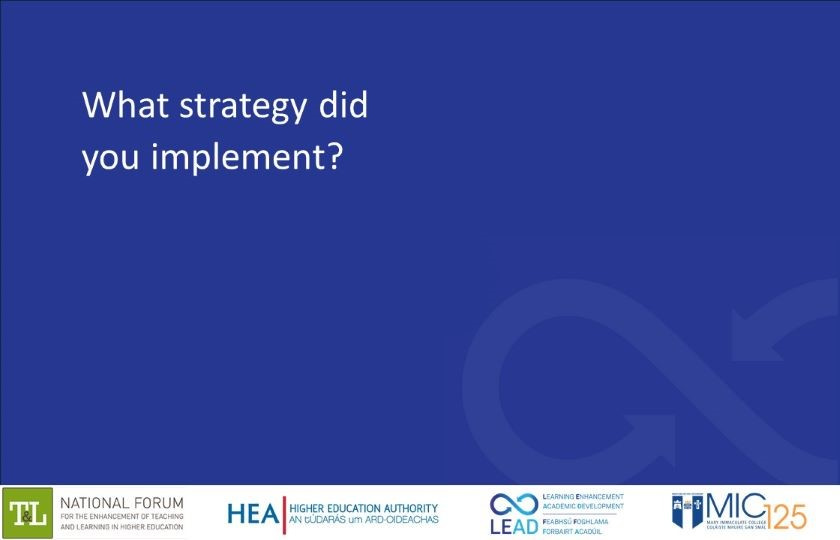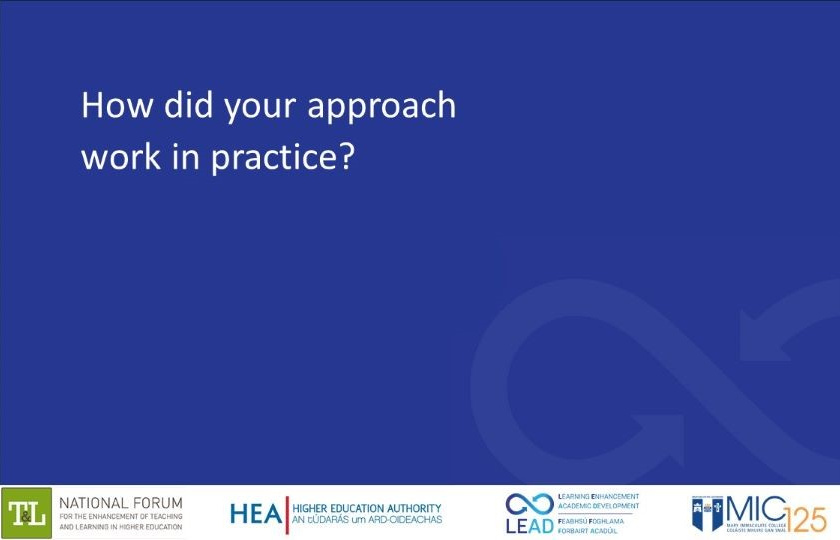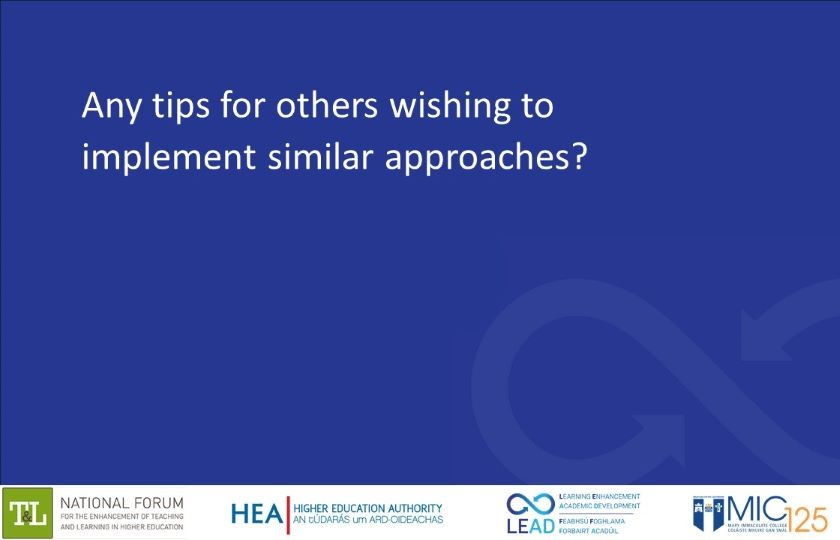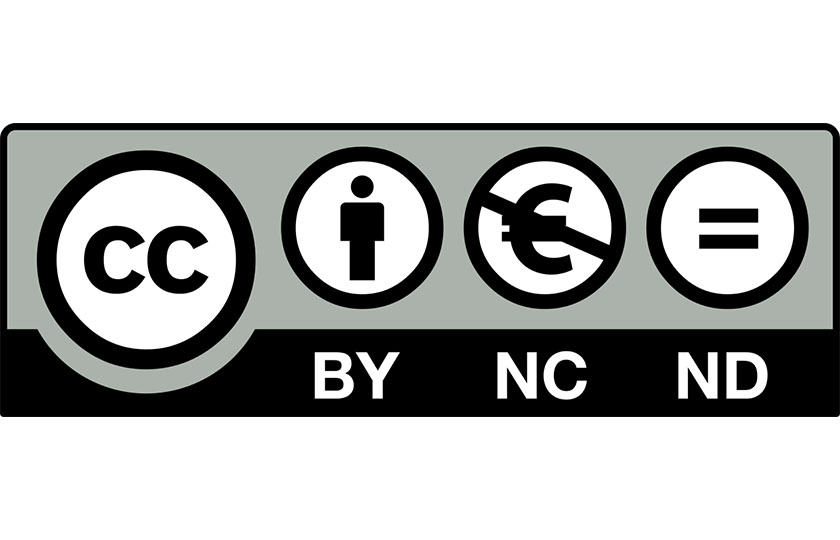Authentic Assessment in Physical Education
Authentic Assessment in Physical Education
| Lecturers - Michelle Dillon & Dr Déirdre Ní Chróinín |
|---|
| Discipline - Primary Physical Education |
| Subject - Social Concepts in Physical Education and Sport |
| Level - 4th Year B Ed Specialism Module |
| Class Size - 32 students |
| Mode of Delivery - In-person |
In this module future primary teachers learn about social justice issues and how to begin to address these issues in Physical Education. Sometimes these ideas can feel out of reach for beginning teachers. We used a combination of analysing physical activity participation experiences, case studies and scenarios, as well as observation and teaching with primary-school aged children to promote applied learning. We made explicit links between these activities and the module assessment.
Rationale
The challenge we faced in EDE402, a module that introduces future primary teachers to Social Concepts in Physical Education and Sport Settings, was getting our future teachers to see the relevance of big social justice ideas in their everyday teaching, and to identify attainable actions to make a difference in children’s lives.
Description of the Teaching and Learning Approach

In this module we addressed this issue by promoting applied learning through 1) analysis of practical activity participation where teacher educators modelled strategies with students and afterwards reflected on their effectiveness, 2) exploration of case studies and scenarios illustrating reactive and proactive approaches to addressing social justice issues, and 3) engagement in observation and teaching with primary-school aged children. Please click here to download the peer observation sheet used for this task. Authentic assessment of learning in this module drew on these three learning approaches by making direct connections with both formative tasks and a summative reflective portfolio.
Weekly formative tasks were related to each section of the summative reflective portfolio. These were discussed in class but not graded. For example, one formative task asked students to consider how the idea of facilitating socially just learning environments might be applied to their learning activities within the module, as well as how they could plan for this idea in a primary school. This example shows how formative assessment activities promoted a democratic approach for students with opportunities to influence the direction of their learning. It also demonstrates how students were encouraged to make connections to their future teacher role. This task prepared students for teaching episodes and it connected to the introduction section of the summative reflective portfolio. Through the use of these types of formative tasks, we scaffolded student learning and gave them the practical skills they needed to complete their summative reflective portfolio.
Their summative assessment was an evidence-based reflective report that drew on module learning to plan and analyse team teaching experiences with children. Emphasis was placed on the practical application of ideas when teaching physical education in primary schools. Students reflected on the complex nature of facilitating democratic pedagogies by responding to prompts that helped them to consider the implications of using democratic approaches to promote social justice in their teaching. Please click here to download the assessment details for this reflective report (word file).
What Worked and Why?

Student assignments showed that our approach was successful in helping them make connections between their own understanding, positionality, approaches, and actions towards social justice. Students articulated the value and role of ‘voice and choice’ when teaching young people in Physical Education. Over a series of weeks students learned to listen and respond to children’s ideas through observing and teaching primary-school aged children. Students planned and taught with attention to children’s likes and dislike, they supported children to make tiny choices about their participation and to make changes to activities to better suit their needs. Students successfully analysed their experiences and articulated implications for their future teaching. For us, as teacher educators, supporting our students in engaging with young children directly brought the module ideas to life. We especially appreciated the opportunities to give our students feedback on these teaching episodes in ways that connected module activities with the module assessment.
Any Problems or Issues that Arose from this Approach?
Facilitating deep reflection on social justice takes time but we are encouraged that making connections in applied settings are key to promoting awareness and action towards socially just physical education. Beginner teachers are grappling with a range of challenges related to learning to teach physical education. Sometimes, overwhelmed by these, addressing the needs of individual children can feel beyond reach. We are encouraged that breaking down issues, identifying explicit examples of actions, applying these with primary-aged children, reflecting on and analysing these experiences, has helped these students see social justice as part of their teacher role.
It can be challenging to prepare the future teachers for encounters with the children. Each week a specific theme was identified and the future teachers were prepared to work around this. Inevitability, the children sometimes deviated from the plans. The teacher educator’s role is pivotal in preparing future teachers to respond to the unpredictability of children’s reactions and needs in a given situation.
Tips for Implementation

- Make explicit connections between formative tasks and summative assessment: each formative task should help students complete a section of their summative portfolio. Assign time to discuss each formative task in class.
- Assign class time for students to plan for teaching primary school-aged children. Ensure students get feedback (lecturer and peer) on these plans. The feedback should consider how voice and choice are being enacted and how students might respond to the children’s ideas. For us, these conversations were critical to students making sense of ideas.
- Make direct links between the summative portfolio tasks and module learning activities. For example, Teach 1 encouraged the students to focus on the children’s likes/dislikes in relation to physical education participation. Through this task, students developed a section of their summative portfolio which required students to write a 750-word reflection on the forementioned topic. As part of this reflection, students were encouraged to outline how their lesson planning was informed by the insights provided by the children.
- KEEP: The value of involving primary school aged children in module activities: Learning experiences with children brought ideas to life for students in ways that helped them see the value of both proactive and reactive pedagogies of social justice.
- KEEP: There was a wide variety of ideas in the summative assessment products students submitted. The summative reflective portfolio encouraged students to direct their own learning and to make sense of their personal learning journey within module activities.
- CHANGE: It is challenging to balance in-depth critical engagement with an applied hands-on focus. To address this, we plan to re-organise module activities to place contact with children earlier in the semester. This should allow for dedicated reflections on these experiences in the last few weeks in the module. This will support students to critically engage with social justice ideas more deeply.
Except where otherwise noted, content on the LEAD section of this website is licensed under a Creative Commons Attribution 4.0 International licence.
Social Concepts in Physical Education Assessment Details
Assessment Mode: Evidence-based Reflective Report
Using a social justice lens, students will design and reflect on a set of activities delivered to a group of young people over three on-campus teaching experiences. The theme for the on-campus experiences is “Giving Children Choices: Finding Children’s Voices”. Each week students will be provided with a consideration that they must then plan for and teach in support of. Using literature and in-class experiences (on and off campus) students’ will critically discuss planning and teaching decisions and in turn reflective deliberations on the complex nature of facilitating democratic pedagogies. Students will plan for the teaching episodes in small groups, however the assessment is an individual assignment weighted at 100% for the module.
The assignment submission is to be structured using the following headings. Appropriate literature needs to be embedded throughout.
Introduction: The value and role of ‘voice and choice’ when teaching young people in Physical Education (500 words)
#Teach One (Consideration: Children’s Likes / Dislikes) (750 words)
- Planning considerations and rationale
- Insights gained through teaching/observing on-campus
#Teach Two (Consideration: Tiny Choice) (750 words)
- Planning considerations and rationale
- Insights gained through teaching/observing on-campus
#Teach Three (Consideration: Change One Thing) (750 words)
- Planning considerations and rationale
- Insights gained through teaching/observing on-campus
"Using democratic approaches promotes teaching for social justice." Discuss the implications of this statement for your future practice. (750)
Except where otherwise noted, content on the LEAD section of this website is licensed under a Creative Commons Attribution 4.0 International licence.
- Authentic Assessment in Physical Education
- Social Concepts in Physical Education Assessment Details








